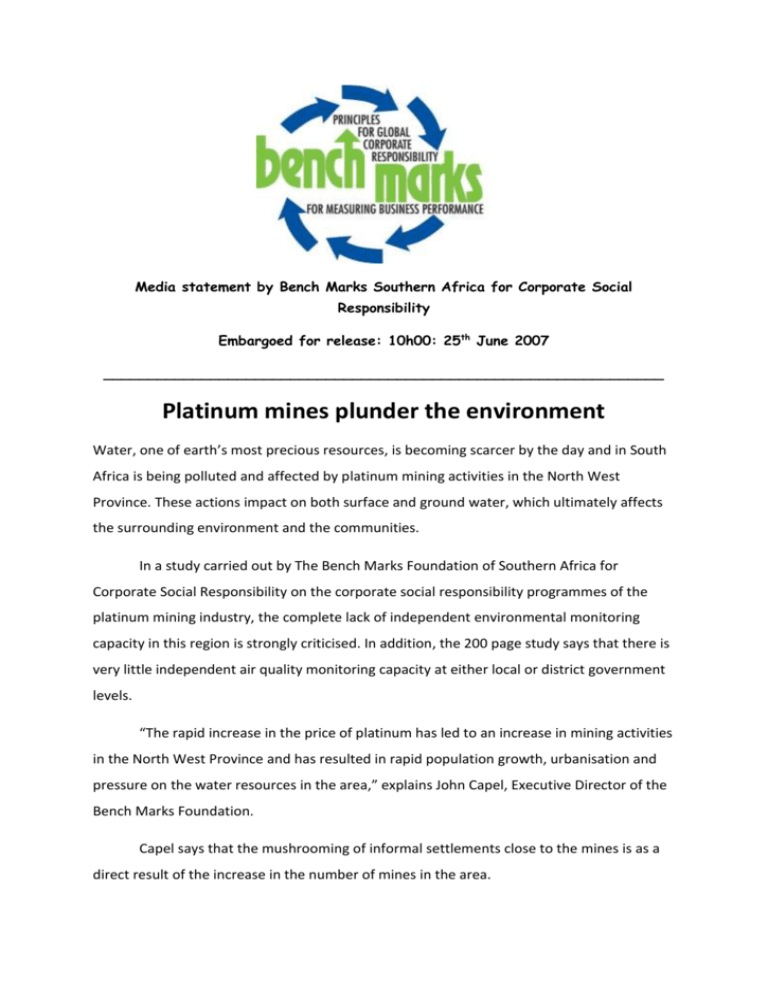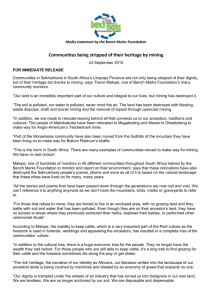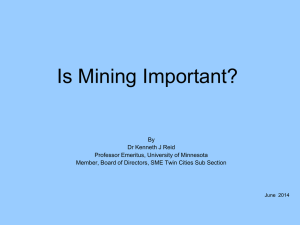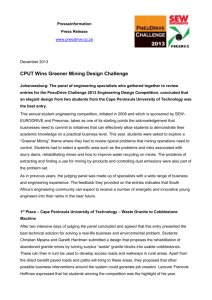070625_pr_platinum_mines_environment_final
advertisement

Media statement by Bench Marks Southern Africa for Corporate Social Responsibility Embargoed for release: 10h00: 25th June 2007 _______________________________________________________________ Platinum mines plunder the environment Water, one of earth’s most precious resources, is becoming scarcer by the day and in South Africa is being polluted and affected by platinum mining activities in the North West Province. These actions impact on both surface and ground water, which ultimately affects the surrounding environment and the communities. In a study carried out by The Bench Marks Foundation of Southern Africa for Corporate Social Responsibility on the corporate social responsibility programmes of the platinum mining industry, the complete lack of independent environmental monitoring capacity in this region is strongly criticised. In addition, the 200 page study says that there is very little independent air quality monitoring capacity at either local or district government levels. “The rapid increase in the price of platinum has led to an increase in mining activities in the North West Province and has resulted in rapid population growth, urbanisation and pressure on the water resources in the area,” explains John Capel, Executive Director of the Bench Marks Foundation. Capel says that the mushrooming of informal settlements close to the mines is as a direct result of the increase in the number of mines in the area. “This has further negatively impacted on the state and quality of surface water due to the fact that most communities are still using pit latrines and the bucket system.” The effect of tailings dams and construction activities on the Platinum Region is another cause for concern. Silt flows from tailings dams have an impact on the surface water systems in the area. The land degradation that occurs through soil erosion, construction activities and the destruction of vegetation causes highly suspended solid loads to find its way to water and may cause sedimentation. The harmful effects of this can already been seen in the tests done in the Bospoort Dam, Klipvoor Dam, Roodekopjes Dam, Leeukraal Dam, Boskop Dam and Potchefstroom Dam, all of which showed high levels of total dissolved levels (TDS), caused by salinisation (a progressive increase in the concentration of salts in water). Capel adds that mines pump out millions of cubic litres of underground water every year. In most cases much of this water is reused in mining activities. “However, groundwater is critically important to the communities, especially the rural communities who rely on groundwater as their only source of water.” Amongst the effects noted in respect of the pumping out of water by mines are a change in the direction of flow of underground water, drying up of springs, seepage of heavy metals into ground water and serious drops in the levels of ground water. The surrounding environment is being affected due to acid mine drainage from mine residue and waste dumps. The study found that nothing is said by the mines in any of their reports of the proximity of villages and informal settlements to major waste facilities such as slimes dams and tailing dams. Potential leakages and the problem of duct impact on informal communities. The mines are silent on this and on the loss of productive land to waste facilities. The report also notes that due to the increasing number of platinum smelters in the area, carbon dioxide and sulphur dioxide emissions has increased, resulting in a dramatic increase in respiratory infections. Capel warns: “Apart from the immediate harmful impact on the community, this increase in emissions will eventually give rise to acid rain. Some farmers in the area are already complaining that the dust and emissions from the mines and smelters are impacting on their citrus crops.” The Bench Marks report, however, offers various suggestions that communities as well as mines could implement in order to lessen the long-term effects of mining on the environment, such as reed and grass production as part of mine waste rehabilitation. Many of these suggestions will see the communities benefiting directly since they will provide employment as well as generate income and alleviate the levels of poverty in the area. While the negative affects of mining in the North West Province is becoming apparent due to studies such as the one done by the Bench Marks Foundation, the effects of gold mining on the groundwater and air quality in other parts of South Africa should be kept in mind. This will give an idea of what is in store for the North West province by platinum mining if they continue to plunder the area without mitigating the effects that they have on the land and communities. ENDS __________________________________________________________________________ The full report together with all the recommendations and photographs can be found on: www.bench-marks.org. Bench Marks Foundation Southern Africa (The Bench Marks Foundation) is part of an international NGO and Faith Based coalition that also has partners in Australia, Hong Kong, Canada, the USA, Colombia and the United Kingdom. Its partners in South Africa are the SA Council of Churches, the Ecumenical Service for Socio-Economic Transformation (ESSET), Industrial Mission of South Africa, and the Justice and Peace Department of the South African Catholic Bishops Conference. The Bench Marks Foundation is committed to providing leadership and advocacy on issues regarding benchmarking of good corporate governance, ethical and socially responsible investment as well as linking people and institutions committed to these ideals. ______________________________________________________________ Issued by Quo Vadis Communications on behalf of Bench Marks Foundation of Southern Africa. QUO VADIS COMMUNICATIONS AND ITS STAFF MAY NOT BE QUOTED ON BEHALF OF BENCH MARKS Media contact: Chantal Meugens Cell: 083 676 2294 or 011 955 5033 or 011 487 0026 E-mail: chantal@quo-vadis.co.za Client contact: John Capel, Executive Director, Bench Marks Foundation Southern Africa Cell: 082 874 2653 Tel: 011 832 1743








